
Camp X-Ray was a temporary detention facility at the Guantanamo Bay detention camp of Joint Task Force 160 on board the United States Naval Station Guantanamo Bay. The first twenty detainees arrived at Guantanamo on 11 January 2002. It was named Camp X-Ray because various temporary camps used to house Cuban and Haitian migrants in the 80s and 90s on board the station were named using NATO phonetic alphabet. The legal status of detainees at the camp, as well as government processes for trying their cases, has been a significant source of controversy; several landmark cases have been determined by the United States Supreme Court.

Michael R. Lehnert is a retired major general of the United States Marine Corps. He supervised the construction and served as the first commandant of the Guantanamo Bay Detention Camp.
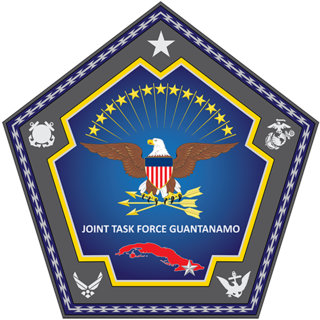
Joint Task Force Guantanamo (JTF-GTMO) is a U.S. military joint task force based at Guantanamo Bay Naval Base, Guantánamo Bay, Cuba on the southeastern end of the base. JTF-GTMO falls under US Southern Command. Since January 2002 the command has operated the Guantanamo Bay detention camps Camp X-Ray and its successors Camp Delta, Camp V, and Camp Echo, where detained prisoners are held who have been captured in the war in Afghanistan and elsewhere since the September 11, 2001 attacks. From the command's founding in 2002 to early 2022, the detainee population has been reduced from 779 to 37. As of October 21, 2022, the unit is under the command of U.S. Army Brigadier General Scott W. Hiipakka.
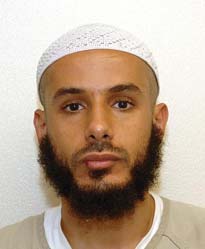
Fouzi Khalid Abdullah Al Odah is a Kuwaiti citizen formerly held in the United States Guantanamo Bay detainment camps, in Cuba. He had been detained without charge in Guantanamo Bay since 2002. He was a plaintiff in the ongoing case, Al Odah v. United States, which challenged his detention, along with that of fellow detainees. The case was widely acknowledged to be one of the most significant to be heard by the Supreme Court in the current term. The US Department of Defense reports that he was born in 1977, in Kuwait City, Kuwait.
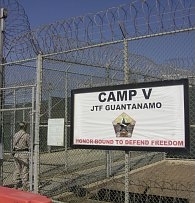
The Guantanamo Bay detention camp, also known as GTMO or GITMO, is a United States military prison within Naval Station Guantanamo Bay (NSGB), on the coast of Guantánamo Bay, Cuba. It was established in January 2002 by U.S. President George W. Bush to hold terrorism suspects and "illegal enemy combatants" during the Global War on Terrorism following the attacks of September 11, 2001. As of August 2024, at least 780 persons from 48 countries have been detained at the camp since its creation, of whom 740 had been transferred elsewhere, 9 died in custody, and 30 remain; only 16 detainees have ever been charged by the U.S. with criminal offenses.

Faiz Mohammed Ahmed Al Kandari is a Kuwaiti citizen who was held in extrajudicial detention in the United States' Guantanamo Bay detainment camp in Cuba, from 2002 to 2016. He has never been charged with war crimes.
Taj Mohammed is a citizen of Afghanistan who was held in extrajudicial detention in the United States Guantanamo Bay detention camps, in Cuba. His Guantanamo Internment Serial Number was 902. Joint Task Force Guantanamo counter-terrorism analysts estimate Mohammed was born in 1981. He was repatriated in 2006.
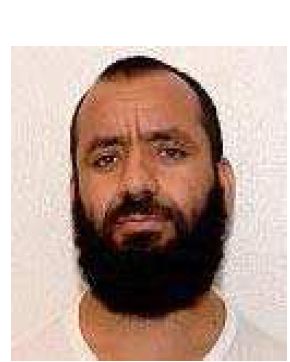
Maasoum Abdah Mouhammad, a citizen of Syria, was formerly held in extrajudicial detention in the U.S. Guantanamo Bay detention camps, in Cuba.

Muhammad Ali Abdallah Muhammad Bwazir is a citizen of Yemen, once held in extrajudicial detention in the United States Guantanamo Bay detainment camps, in Cuba. Bwazir's Guantanamo Internment Serial Number was 440. American intelligence analysts estimate he was born in 1980, in Hawra', Yemen.
Abd al-Salam al-Hilah is a citizen of Yemen, held in extrajudicial detention in the United States Guantanamo Bay detainment camps, in Cuba.

Ridah Bin Saleh Bin Mabrouk al-Yazidi is a citizen of Tunisia held in extrajudicial detention in the United States Guantanamo Bay detainment camps, in Cuba since the day it opened, on January 11, 2001. Al Yazidi's Guantanamo detainee ID number is 38.

Moath Hamza Ahmed al-Alwi is a citizen of Yemen, held in extrajudicial detention in the United States Guantanamo Bay detainment camps, in Cuba. His detainee ID number is 28. Guantanamo analysts estimated he was born in 1977, in Al Hudaydah, Yemen.
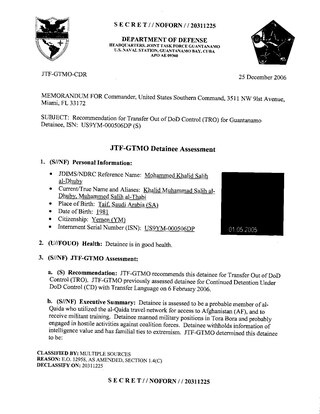
Khalid Mohammed Salih Al Dhuby is a citizen of Yemen, who was held in extrajudicial detention in the United States's Guantanamo Bay detention camps, in Cuba for almost fourteen years. His Guantanamo Internee Security Number is 506. American intelligence analysts estimate that Al Dhuby was born in 1981, in Ta'if, Saudi Arabia.

Sharqawi Abdu Ali al-Hajj, also known as Riyadh the Facilitator, is a Yemeni alleged Al-Qaeda associate who is currently being held in the United States' Guantanamo Bay detention camps, in Cuba. He is accused of being a "senior al-Qaida facilitator who swore an oath of allegiance to and personally recruited bodyguards for Osama Bin Laden".
The Parwan Detention Facility is Afghanistan's main military prison. Situated next to the Bagram Air Base in the Parwan Province of Afghanistan, the prison was built by the U.S. during the George W. Bush administration. The Parwan Detention Facility, which housed foreign and local combatants, was maintained by the Afghan National Army.
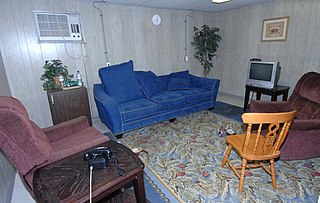
After the United States established the Guantanamo Bay detention camp at its naval base in Cuba, officials occasionally allowed Guantanamo captives' phone calls to their family. In 2008 the Joint Task Force Guantanamo that manages the camps developed rules regarding phone calls: all detainees who met certain conditions were allowed to make one call home per year.

Karen Joy Greenberg is an American historian, professor, and author. She is Director of the Center on National Security at Fordham University School of Law.

Carol Rosenberg is a senior journalist at The New York Times. Long a military-affairs reporter at the Miami Herald, from January 2002 into 2019 she reported on the operation of the United States' Guantanamo Bay detention camps, at its naval base in Cuba. Her coverage of detention of captives at the Guantanamo Bay detention camp has been praised by her colleagues and legal scholars, and in 2010 she spoke about it by invitation at the National Press Club. Rosenberg had previously covered events in the Middle East. In 2011, she received the Robert F. Kennedy Journalism Award for her nearly decade of work on the Guantanamo Bay detention camp.
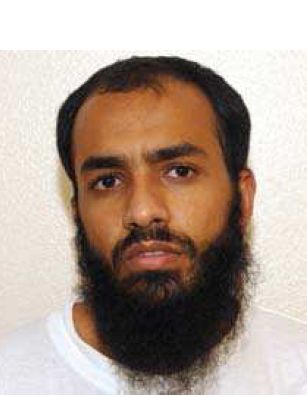
Muhammaed Yasir Ahmed Taher was a citizen of Yemen, who was held in extrajudicial detention in the United States's Guantanamo Bay detention camps, in Cuba. His Guantanamo Internment Serial Number was 679. American intelligence analysts estimate he was born in 1980, in Ibb, Yemen.
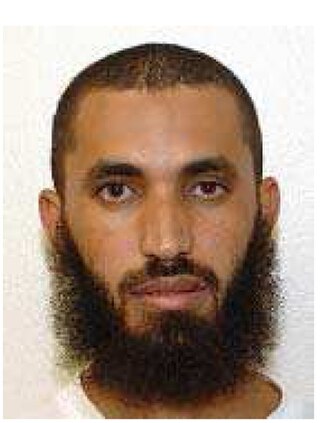
Abdel Malik Ahmed Abdel Wahab Al Rahabi is a citizen of Yemen who was held in extrajudicial detention by the United States from December 2001 to June 22, 2016. He was one of the first twenty captives transferred to the Guantanamo Bay detention camps, in Cuba, on January 11, 2002, and was held there until he was transferred to Montenegro, which granted him political asylum.
















